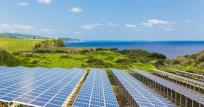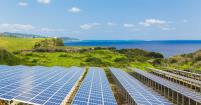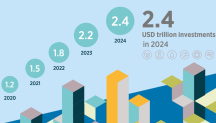

Through Renewables, Islands Seek to Turn Urgency into Opportunity
Newsletter
New IRENA tools and platforms to aid energy transition among small island states seek to turn urgency into opportunity
For many small island developing states (SIDS), energy access—the power to light classrooms and keep medicines refrigerated, charge mobile phones, and cook food—is at the heart of their efforts to accelerate the energy transition. For this reason, working with island states to develop clean, sustainable sources of energy for their populations, while eliminating costly and wasteful foreign payments for fossil fuels and improving energy security, is a critical area of focus for the International Renewable Energy Agency (IRENA).
IRENA hosted a special high-level side event on the margins of the Eighth Session of the IRENA Assembly aimed at improving the capacity of SIDS to develop, and secure financing for, renewable energy projects. As the global platform for cooperation on renewable energy IRENA is uniquely placed to bring countries together to develop joint solutions to climate and sustainable development challenges, and this side event provided an ideal opportunity for Members to share experiences, needs, and best practices.
IRENA Director-General Adnan Z. Amin opened the High Level Meeting on Scaling up Renewable Energy Deployment in Small Island Developing States with a reminder of the vulnerability of many SIDS to climate change, as evinced through the numerous devastating tropical storms experienced last year.
During the opening statements, heads of state, government ministers, and other island leaders reiterated their sense of determination and clear purpose on advancing climate resilience through renewable energy. All stressed the importance of partnerships.
As H.E. Djaffar Hassani, Vice President of the Union of the Comoros put it, “Development cannot take place without energy. Renewable energy is the key to helping our population achieve development.”
“We are at the forefront of the fury of climate change. We are small, but resilient and partners like IRENA are invaluable to helping us achieve energy security.”, said H.E. Gail Rigobert, Minister of Education, Innovation and Sustainable Development of Saint Lucia
Today, the total renewable capacity in all SIDS accounts for more than 2 GW. More than 250 MW of renewable energy capacity has been installed from 2014 to 2016, out of which 123 MW of solar PV, 95 MW of bioenergy and 11.5 MW of wind.
Today’s side event takes place under the umbrella of IRENA’s SIDS Lighthouses Initiative (LHI), a global effort involving 36 SIDS and 19 development partners to mobilise USD 500 million for renewable energy investment, deploy 100 MW of new photovoltaic and 20 MW of new wind power, by 2020. Strong commitment from Member States and strengthening global political momentum have propelled the initiative rapidly forward.
“We achieved the ambitious targets of the SIDS Lighthouses Initiative in only half the time. As we move into the future there is significant momentum to go further.” – IRENA Director-General Adnan Z. Amin
IRENA’s SIDS roadmaps—pathways that cover the necessary technical, economic and policy elements for islands to transition to renewable energy—can have a profound impact on third-party renewable energy investment in islands. For example, the Kiribati Integrated Energy Roadmap (KIER) was used by the World Bank’s SREP funding programme for renewable generation in South Tarawa and Kiritimati. A roadmap analysis for Palau, which provides renewable energy deployment options for the main national grid, is being used by the government of New Zealand to support Palau’s renewable energy goals.
To accelerate the SIDS energy transition, IRENA has developed Quickscans, a tool to rapidly assess barriers and opportunities for renewable energy deployment in SIDS. Quickscans have been undertaken in 38 countries to date, with the Association of the Overseas Countries and Territories of the European Union (OCTA) applying the methodology to a further 18. This helped SIDS uncover areas where specific support is needed, identify priority areas, and guide follow-up action.
Among some small island developing states, plans are already in place to achieve 100% renewables in the near future. Many of these draw on IRENA’s grid integration studies, sources of practical guidance to inform national implementation plans. Among the Cook Island and Samoa, for example, grid integration studies identified technical constraints with the development of renewable energy projects. A grid integration study in Antigua gave policy-makers and the public utility insights on the amount of variable renewable energy that can be implemented on the island without major infrastructure upgrades. The study helped dispel the technical doubts to move forward with planned PV projects, and facilitated national discussions about more ambitious targets.
H.E. Henry Puna, Prime Minister of the Cook Islands was unequivocal about the role of renewable energy in helping his country to meet its needs: “On many of our remote islands, the ability to generate power 24-hours a day was a dream. We were slaves to an essential, but high-cost imported product. Today, even the least-populated of the Cook Islands have 24-hour renewable power, creating greater food security and alleviating poverty.”
Small island developing states are the ‘Ground Zero’ of climate change. Nowhere else is the imperative of the global energy transition more urgently felt, and nowhere else is the need to develop domestic sources of clean and sustainable energy more critical. Armed with IRENA’s knowledge, tools, services and platforms for energy co-operation, planning and finance, small island developing states are better equipped to transition to clean, sustainable and secure sources of power. Today’s event was a small, but important, step in the right direction.
Or, as H.E. Gail Rigobert, Minister of Education, Innovation and Sustainable Development of Saint Lucia put it: “We are at the forefront of the fury of climate change. We are small, but resilient and partners like IRENA are invaluable to helping us achieve energy security.”




